A company’s efficiency in the management of its supply chain has become very important. Enterprises have to source products at the earliest, produce them cheaply, and deliver them as early as possible. This can be achieved through the usage of Supply Chain Management Software through which many organizations optimize and automate several processes in a supply chain.
These software makes an organization more productive, cost-effective, and collaborative among different parties involved with the enterprise, thus, companies are given a better competitive advantage in the marketplace.
In today’s blog we will talk about some popular supply chain management software tools in depth. let’s get started!
What is Supply Chain Management Software?
Supply Chain Management (SCM) Software is a digital tool or suite of applications designed to streamline and automate the processes involved in managing the movement of goods, services, and information from the point of origin to the final customer.
The supply chain includes the following activities: the production, shipment, and distribution of any product from raw material procurement until final delivery to the customer.
SCM software is designed to help businesses manage inventory and track goods as they flow along the supply chain in real-time; to predict future demand; manage orders when they come in; maintain a connection with suppliers; and perform other related functions.
5 Main Key Features of Supply Chain Management Software
1. Inventory Management
One of the largest facilities that SCM software offers is the facility of stock management. The tool keeps the inventory level in track, enables order management, and ensures the right amount of products at a particular time. Over- and stock-out have probabilities that would result in lost sales or higher storage costs.
Advanced SCM software follows the tracking of inventory reordering and forecasting demand, ensuring the right inventories at the right times, and therefore a business can fulfill any demand coming from customers.
2. Order Management
Order management is another fundamental facility provided by SCM software. This facility enables the companies to process customer orders, track the status of orders, and make necessary arrangements to despatch goods on time.
Order return processing, order cancellation, and back order management in general are facilitated by this system. Such automation of the practices will minimize human errors, increase customer satisfaction, and shorten the order fulfillment cycle.
3. Supplier and Vendor Management
Strictly speaking, the dependability of operations in a supply chain and smooth functioning strictly depend on the effective approach toward supplier and vendor management.
Supply Chain Management Software tracks and manages the relationships with suppliers, monitors the performance of the same, checks whether the vendors meet quality standards, and delivery timelines. Material and product sourcing can also be made easier with added visibility into the capacity lead times and pricing of the supplier.
4. Demand Forecasting and Planning
Demand Forecasting is an activity with direct linkage with supply and demand balancing. It requires the need to analyze historical sales data, seasonal trends, as well as the condition of markets.
It helps the firms to take their decisions proactively in terms of production schedules, inventory levels, and procurement strategies. Higher demand accuracy indicates lesser wastes, reduced stockouts, and optimal utilization of resources.
5. Logistics and Shipping Monitoring Shipments
Logistics would now be one of the major elements of supply chain management. SCM software possesses strong shipping tracking and delivering logistics capabilities. These enable the actual time location of goods as they are in motion moving from suppliers through the various tiers of supply chains to the warehouses and finally to the customer.
This will ensure that the company has full visibility on movement so that it can react proactively to problems, route deliveries better and deliver on time.
Top 10 Supply Chain Management Software
1. Blue Yonder
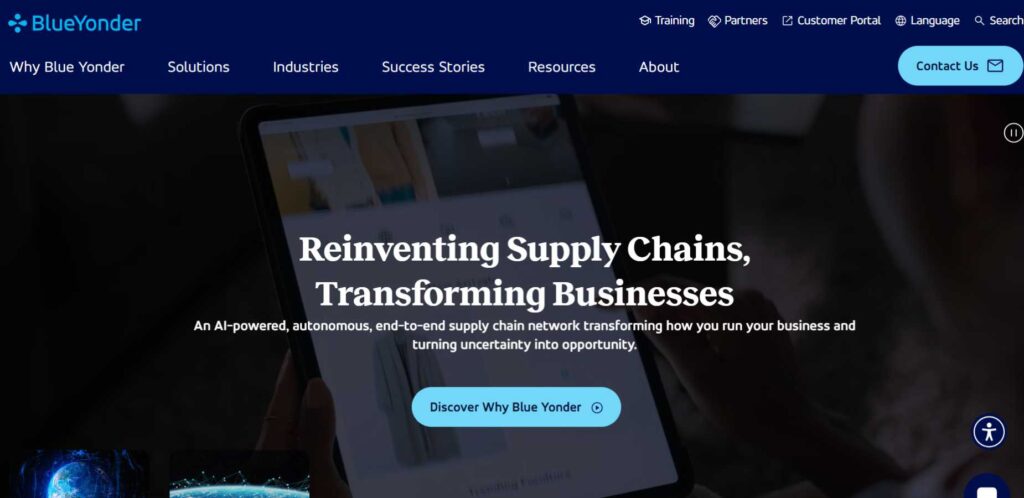
- Ratings: 4.8/5
- Best For: Big enterprises that require AI-driven optimization of their supply chain
Blue Yonder was once JDA Software and is known to be an innovator in AI-based supply chain management solutions that deliver end-to-end visibility and control over even the most complicated business processes. The advanced machine learning algorithms enable the platform to generate predictive analytics and autonomous decision-making power to help businesses reduce inventory levels and cut costs while increasing customer satisfaction.
The software is especially excellent when talking about demand planning, warehouse management, and transportation management. It is a software with really high value in the retail and manufacturing industries because of its cognitive capabilities to process an unbelievable amount of data points in order to predict probable disruptions and even suggest mitigation strategies.
Key Features
- AI-Powered Demand Forecasting and Planning
- Real-Time Inventory Optimization
- Warehouse Management
- Transportation Management and Optimization
- Control Tower for Supply Chain
- End-to-End Visibility and Data Analytics
Pricing:
- Custom pricing based on business size and requirements
- Get a quote contacting sales teams
Website:
https://blueyonder.com
2. SAP SCM
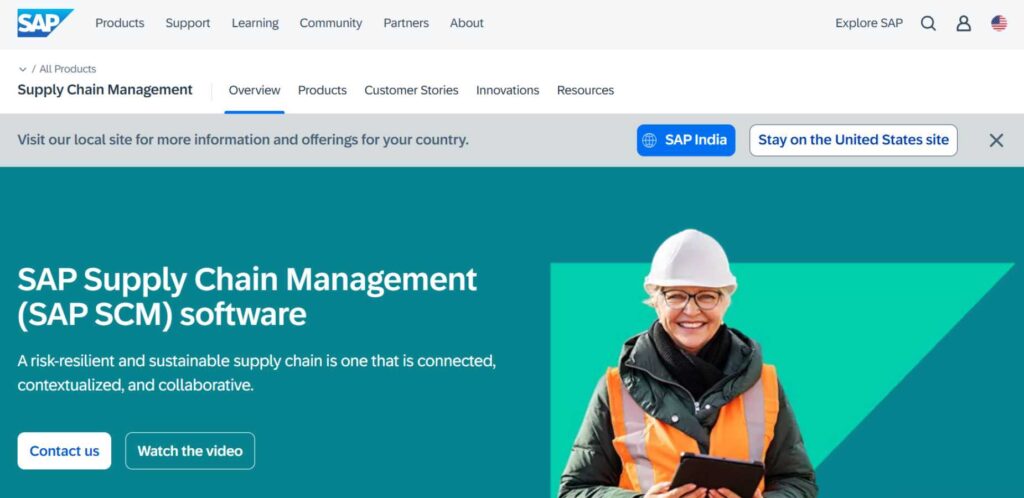
- Rating: 4.7/5
- Best for: Global enterprises where there is the need for ERP integration to the fullest scale
SAP Supply Chain Management is built on some of the salient corners of the SAP ecosystem and is a very robust and highly integrated solution to go well with the most complex supply chain operations. It integrates other modules of SAP to provide a smooth flow of information across an entire enterprise.
The attraction lies in its capability to handle very high volumes of data and complicated business processes in real time and control. SAP SCM has special features in manufacturing planning and execution with highly advanced tools in production planning, detailed scheduling, and quality management.
Key Features:
- Integrated Business Planning
- Advanced ATP and Order Management
- Production Planning and Scheduling
- Quality Management
- Warehouse Management
- Transportation Management
- Global Trade Services
Pricing
| Plan | Pricing |
| Starting | $30,000 |
Website:
https://www.sap.com/products/scm.html
3. Oracle SCM Cloud

- Rating: 4.6/5
- Best For: Mid to large enterprises seeking cloud-native solutions
Oracle SCM Cloud is the future of supply chain management- a modern, cloud-native approach that encapsulates a rich suite of applications built to work in harmony with one another. The platform stands out from competitors in the capability to integrate emerging technologies such as IoT, blockchain, and AI into traditional supply chain processes to drive at-scale digital transformation.
Oracle’s solution will offer real-time analytics and reporting capabilities across the complete supply network-on both ends, from supplier collaboration to customer fulfillment. Due to its very modular architecture, this allows businesses to begin with only those components needed and scale up as necessary-that makes it extremely desirable for a growing business.
Key Features:
- Order Management
- Inventory Optimization
- Procurement Management
- Supply Chain Planning
- Product Lifecycle Management
- IoT Fleet Management
- Blockchain Track and Trace
Pricing:
| Plan | Pricing |
| Subscription based | Varies |
Website:
https://www.oracle.com/scm
4. E2open

- Rating: 4.5/5
- Best For: Multinational enterprise companies which focuses on multi-enterprise collaboration
E2open provides a connected supply chain based solution that focuses on the utmost exertion of multi-enterprise and trading partners’ collaboration.
Its solution scales to present an online digital twin of the physical supply chain, through real-time visibility and situational decision capabilities. It is great at handling complex and global supply networks because it can relate disparate systems and processes to a singular view. The core capability of E2open lies in its ability to harmonize data from very disparate sources and gives actionable insights through advanced analytics and AI-driven recommendations.
Key Features:
- Multi-enterprise collaboration
- Channel data management
- Demand sensing
- Supply planning
- Logistics management
- Trade compliance
- Business network connectivity
Pricing:
| Plan | Pricing |
| Modular Pricing Structure | Based on subscription |
Website:
https://www.e2open.com
5. Infor SCM
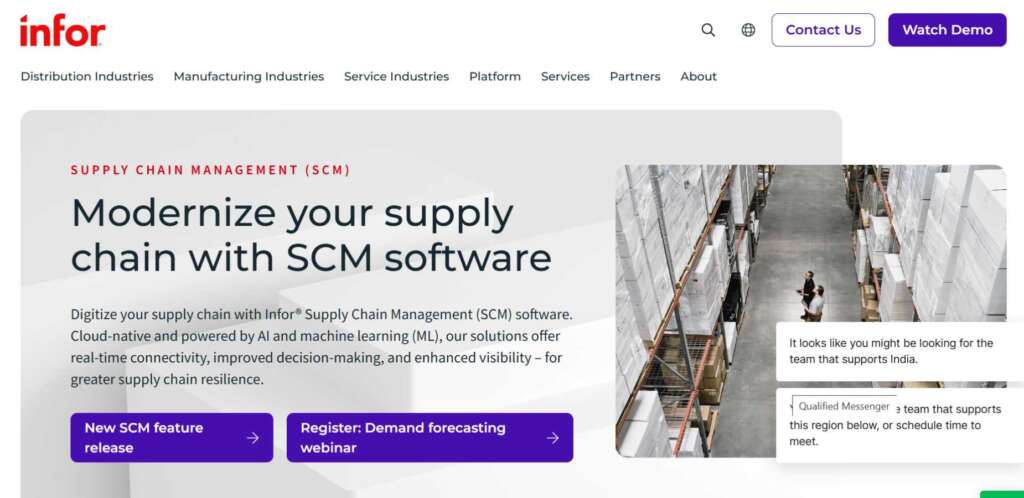
- Rating: 4.4/5
- Best For: Industry-specific supply chain solutions
Infor Supply Chain Management is the industry-specific functionality combined with deep domain expertise in various markets with specific areas of strength in manufacturing, distribution, and retail. Micro-vertical approach: Infor solutions are pre-configured to meet the needs and best practices of industries.
Powerful analytics combined with intuitive user interfaces, which make it easier for organizations to optimize their supply chain operations without taking too much time for training. Its flexibility will depend on how it is able to manage simple and complex supply chain scenarios and has the ability to provide robust forecasting and planning capabilities.
Key Features:
- Specific configurations in the industry
- Demand Planning with Forecasting
- Warehouse Management
- Transportation Management
- Supply Chain Optimization
- Advanced Analytics
- Cloud deployment options
Pricing:
| Plan | Pricing |
| Industry Specific Pricing | Varies |
| Small Businesses | $10,000-$50,000 |
| Large enterprises | $1000,000-$500,000 |
Website:
https://www.infor.com/solutions/scm
6. Epicor SCM

- Rating: 4.3/5
- Best For: Mid-sized manufacturers and distributors
Epicor Supply Chain Management is a company offering an integrated as well as comprehensive solution particularly for manufacturing and distribution companies that want to ease their work. Deep functionality on the platform offers inventory management, purchase management, and advanced material planning, proving to be much more favorable for discrete manufacturers.
The major strengths of Epicor lie in its very smooth integration with the ERP system of Epicor, providing one single platform for all business operations. Software features intuitive interface and industry-specific features that enable an organization to maximize operational efficiency with low costs while maintaining an optimal level of inventory as required.
Key Features:
- Advanced Material Planning
- Inventory Optimization
- Purchase Management
- Supplier Relationship Management
- Quality Management
- Demand Planning
- Warehouse Management
Pricing:
| Plan | Pricing |
| Supply Chain Module | $12,000-$35,000 |
Website:
https://www.epicor.com
7. Precoro

- Rating: 4.2/5
- Best For: Small to medium-sized businesses focused on procurement
Precoro emerges as a procurement and spend management solution that is configured to become friendly to help ease purchasing processes for growing organizations. Exceptional control over spending is gained through automated approval workflows, along with comprehensive budget tracking capabilities. Integrating AI procurement software into such platforms further amplifies these benefits.
Precoro strength in simple complex procurement processes to keep compliance and accountability standards in check. The control it helps deliver is real-time visibility into spending patterns and supplier performance, so the decisions become better and the cost control easier.
Key Features:
- Purchase Order Management
- Approval Workflows
- Budget Tracking
- Supplier Management
- Expense Management
- Document Management
- Reporting and Analytics
Pricing:
| Plan | Pricing |
| Monthly Subscription | Varies |
| Starting | $35/user/month |
| Enterprise | Custom |
Website:
https://precoro.com
8. NetSuite Supply Chain Management
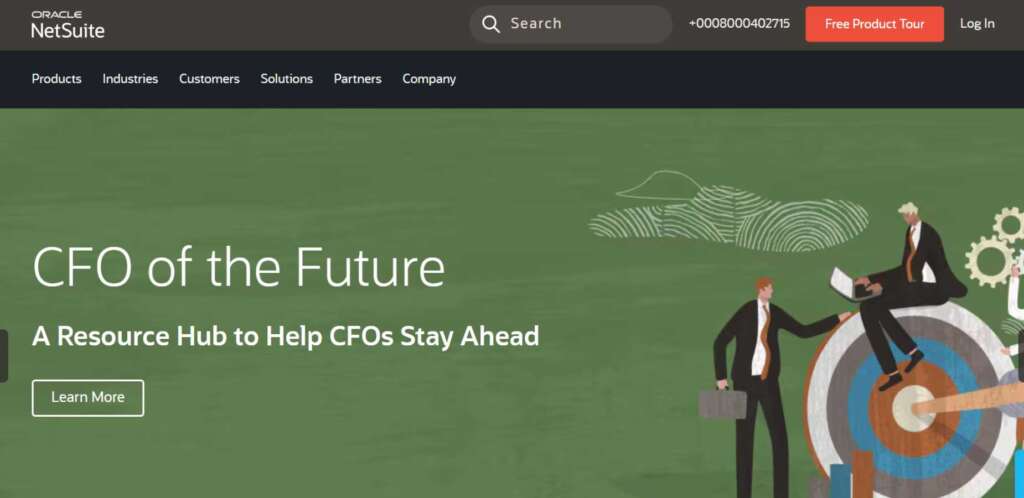
- Rating: 4.5/5
- Best For: Rapidly growing businesses requiring integrated ERP and SCM
NetSuite Supply Chain Management is a unified cloud-based solution that flows with the entire NetSuite ERP platform, hence delivering an all-inclusive insight into supply chain activities. The software shines with real-time insights on inventory levels, supplier performance, and demand patterns across locations and subsidiaries.
NetSuite’s global platform differs from the company by giving its inherent features of multiple currencies, multiple languages, and subsidiaries. Wealthy reporting and analytics capabilities allow companies to make better decisions guided by information whilst maintaining their optimal levels of inventory coupled with reducing carrying costs.
Key Features:
- Demand Planning
- Order Management
- Inventory Management
- Warehouse Management
- Production Management
- Supply Planning
- Procurement Management
Pricing:
| Plan | Pricing |
| Standard | $1,188-4,800 |
| Premium | $11,615-27,600 |
| Ultimate | $7,188-10,200 |
| Enterprise | $7,188-23,988 |
Website:
https://www.netsuite.com/portal/in/home.shtml
9. Manhattan Associates
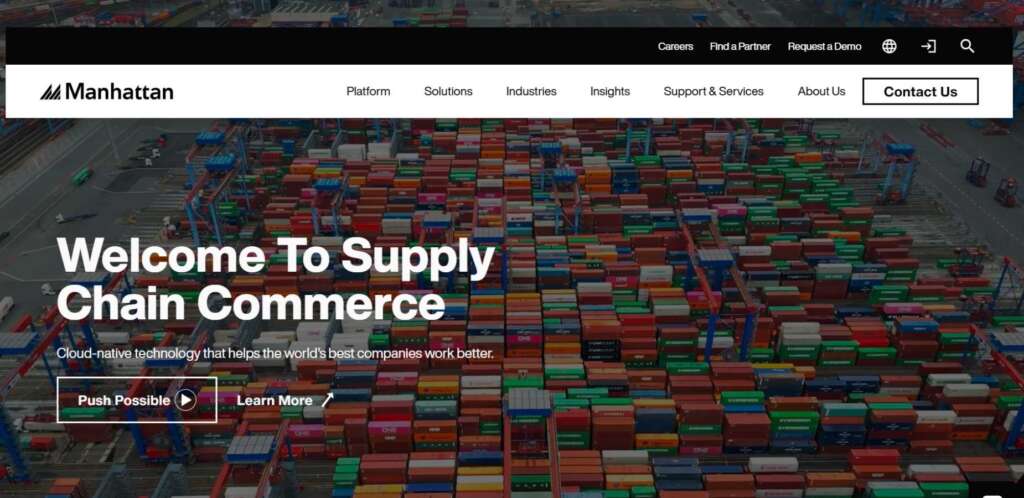
- Rating: 4.7/5
- Best for: Large retailers and distributors who need a premium warehouse management solution
Manhattan Associates offers a best of class suite of supply chain software solutions, particularly in the areas of warehouse management and omnichannel operations. The tool introduces advanced capabilities for effectively controlling complex distribution operations advance inventory optimization and order fulfillment capabilities across multi-channels.
The solution in this case is often effective algorithms that help an organization reduce warehouse labor, space, and inventory movement, thus supporting good service levels. It is what makes Manhattan’s solution unique that it may easily handle high-volume operations and even complex fulfillment scenarios. This reason makes Manhattan’s solution very good for big retail and distribution operations.
Key Features:
- Advanced Warehouse Management
- Transportation Management
- Inventory Optimization
- Order Management
- Labor Management
- Yard Management
- Extended Enterprise Management
Pricing:
| Plan | Pricing |
| Enterprise based | Varies |
Website:
https://www.manh.com
10. Körber Supply Chain

- Rating: 4.4/5
- Best For: Companies looking for flexible warehouse and logistics solutions
Körber Supply Chain (previously known as HighJump), delivers a comprehensive set of supply chain solutions placing flexibility and adaptability at the center of the warehouse and logistics. Their platform may start at a basic level, such as simple warehousing and, on the other end, scale up to highly complex processes, which also allows customizable workflows that can adjust according to specific business needs.
What really strengthens Körber is the modular approach it may be deployed with. This way, an organization can implement only that specific functionality which has been required while still leaving the option to expand capabilities over time. The software is specifically advanced in providing real-time visibility and control of warehouse activities, from extraordinary features in labor management and resource optimization.
Key Features:
- Warehouse Management
- Voice Technology
- Integration Labor Management
- Yard Management
- Transportation Management
- Supply Chain Analytics
- Mobile Solutions
Pricing
| Plan | Pricing |
| Entry level | $5,000/month for up to 5 users and 100 orders/day. |
Website:
koerber-supplychain.com
How to Choose the Best Supply Chain Management Software
For those businesses with increasingly complex supply chains, logistics, inventory, procurement, and distribution management should be agile and capable enough. Read on to know what you should know when selecting the best software for your business.
1. Determine Your Business Needs
Look before you leap. Review your current processes and determine where exactly you have specific pain points. Do you require more visibility into your inventory? Or perhaps better demand forecasting?
Having an idea of your needs will help you target solutions that meet those needs. Thus, if an organization has a lot of warehouse operations then for companies with SCM that can provide and have detailed inquiry and order management would be the favored choice.
2. Evaluate Software Functionalities
With a general sense of your needs, go over the functionalities offered by various SCM software. Certainly, the most common functionalities to check include demand forecasting, inventory management, order management, logistics, and tools for collaboration with suppliers.
The functionality in the software should also support real-time data analytics that will contribute to fast decisions by the company.
3. Integration with Other System
Supply chain software has to integrate well with other systems such as ERP or CRM applications. It helps in smooth distribution of the information across the departments and reduces the risk of data silos.
Make sure that it supports your current infrastructure or any planned upgrades. Most providers support API, so make sure that it is compatible with your systems.
4. Scalability and Flexibility
A good SCM solution will scale with your business. When you start growing your operations, your software should be able to accommodate a higher volume of data, new geographies, and more distribution channels. Select solutions that offer modular or tiered pricing models so that you can add features when required and not burden yourself with costs you do not need.
5. Assess Vendor Support and Training
Only the selection of the right software determines the initial stage; long term success depends on good support and training. Make judgments on support provided by vendors, including availability of a welcome session, training materials, and further support. Ensure that the support of the vendor is available at your business hours and the communication mode that is preferred.
Conclusion
The choice of proper supply chain management software depends on a careful consideration of specific needs in your business as well as features of the software and possible integration and scalability capabilities. When you make the right choice, you will be able to boost productivity while easing operations and ultimately enhance profitability.
FAQs
What is SCM software?
Supply Chain Management software serves the purpose of managing and optimizing an end-to-end supply chain process.
Who can benefit from SCM software?
SCM software will prove to be very effective for a broad spectrum of businesses, in terms of size, industry, and type of operations performed through the supply chain.
What are the costs of SCM software?
Because of the vast differences in SCM software programs, their costs vary greatly, from subscription-based systems to customized enterprise solutions.
Are SCM software programs able to integrate with other software?
Yes, most Supply Chain Management Software solutions have some form of integration capabilities with ERP, CRM, and other software.

